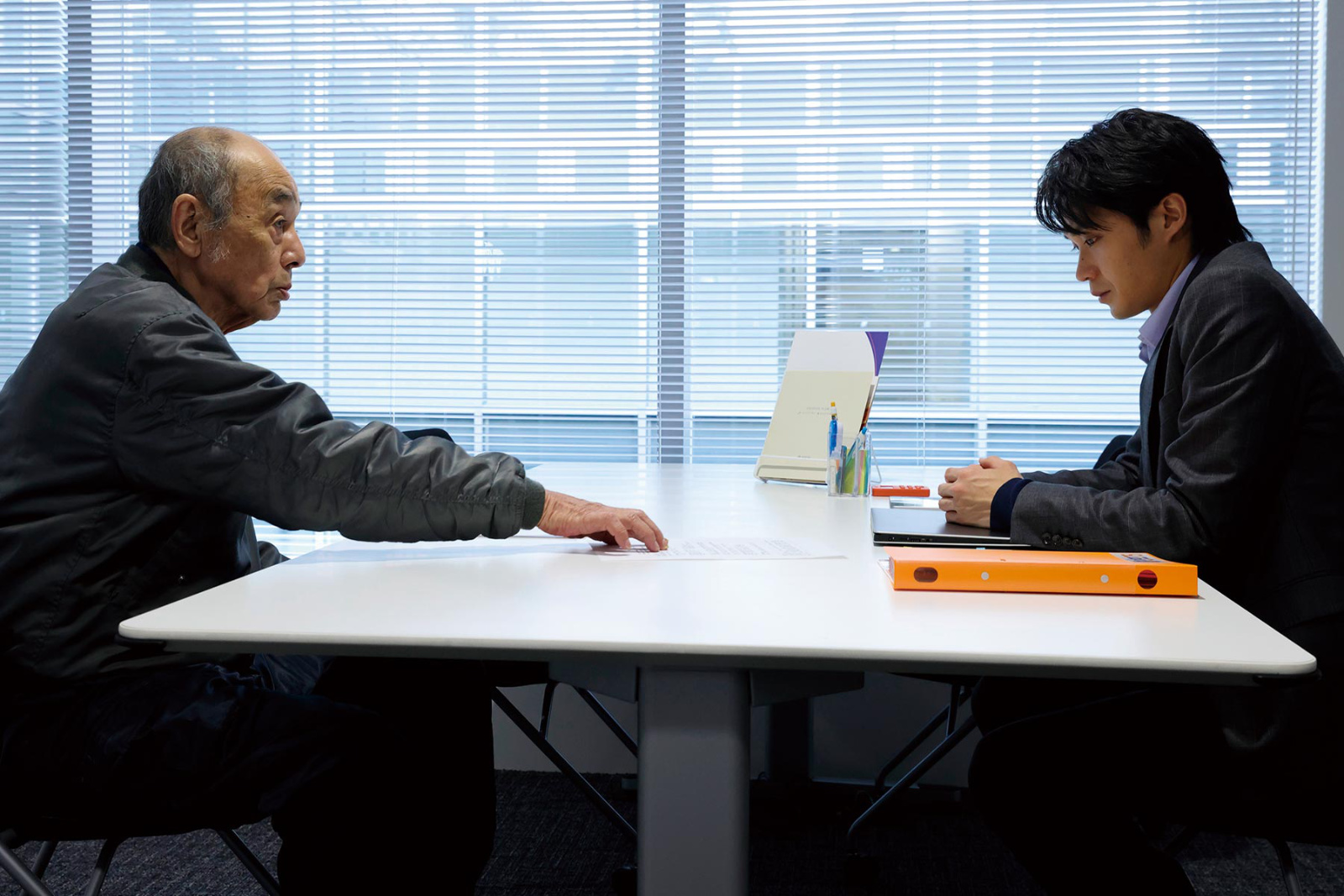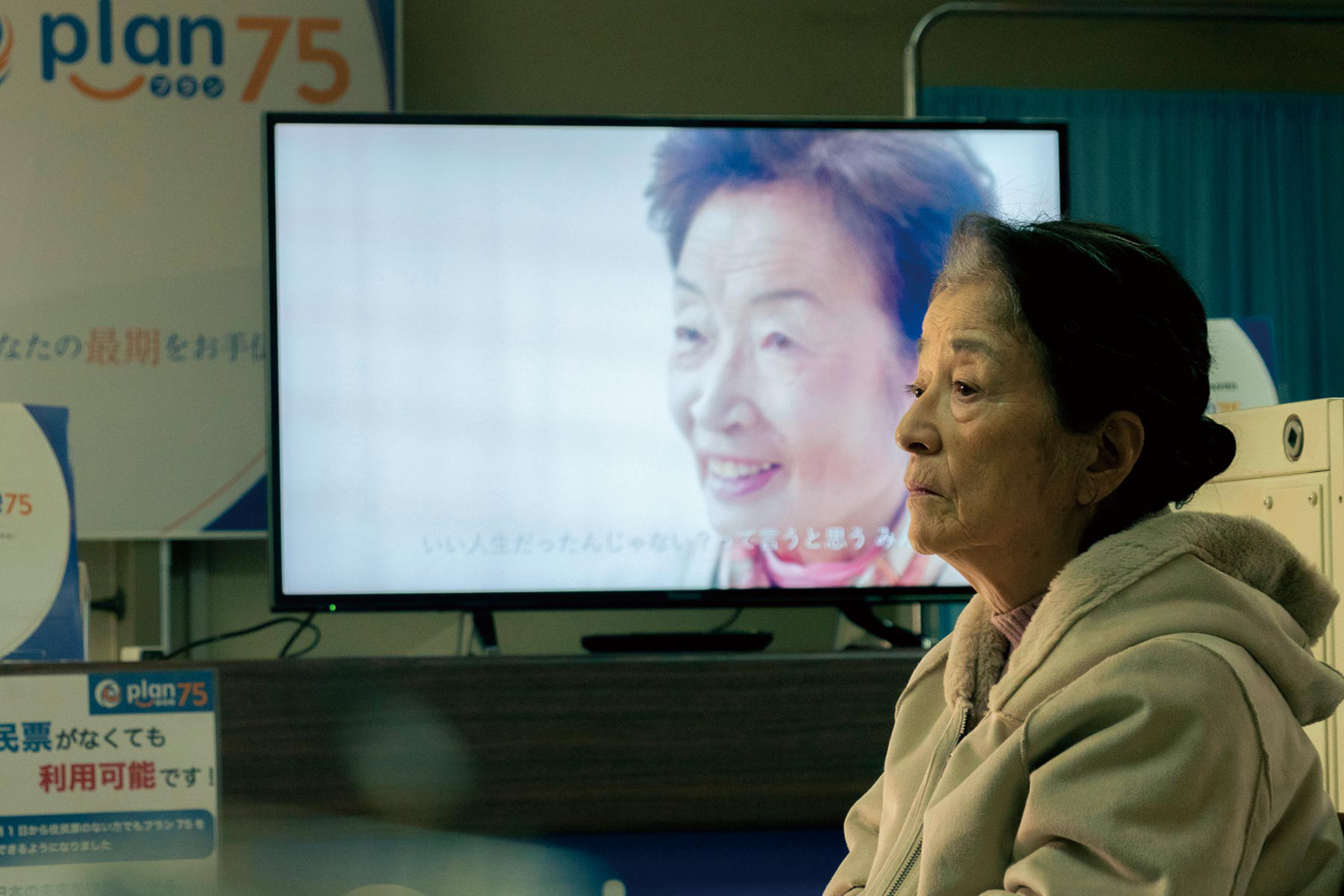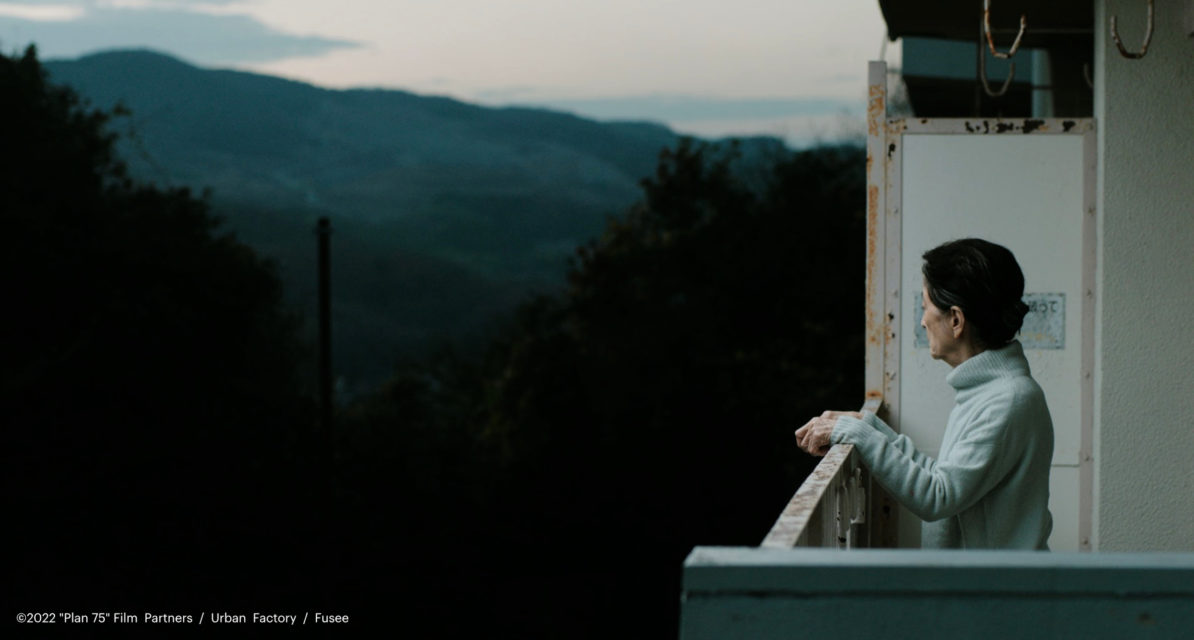Plan 75 opens with a vague image of a dark place. There is a report from a shotgun. A shadowy figure runs in fear. Another shadowy figure emerges, on the prowl. After a moment, another shot is heard. Before long, the perpetrator can be seen relaying their manifesto either on audio or video–something about ending people’s suffering in order to make the country’s future brighter–before turning the shotgun on themselves. It’s an outlandish scene depicting the unthinkable massacre at a care home for the elderly, but is sadly based on an actual crime which took place in Japan. It is the perfect preface for the movie’s core conceit, that no matter how outlandish the plot may seem, it is not beyond the realm of possibility.
The scene then changes to a hotel hallway and a housekeeping cart bathed in light by an open door. A news report coming from a radio describes the massacre at the care home, and how the government is initiating the Plan 75 program in response to this and a rise of violent crimes against the elderly. Michi, the protagonist played by veteran actress Baisho Chieko, emerges from the room as she goes about her job as a cleaning maid. She is a sharp and energetic person who does her job diligently and efficiently. More importantly, the job affords her the companionship of her co-workers who are also around the same age. They spend time with one another both on and off work. It’s obvious the job is as much about companionship as it is financial necessity.
At its heart, Plan 75 is about community, and more specifically the loss of a sense of community. This is seen through the perspectives of four characters, Michi being one of course. The second is Hiromu, a young Plan 75 case worker. He is dedicated and professional, but also thoughtful and compassionate. Third is Yoko, a Plan 75 call center operator whose job is to lend a willing ear to people facing doubts or apprehension as the termination date approaches. Finally is Maria, a Filipino care worker at a senior home working to save money for the operation her daughter in the Philippines needs. However, her salary just isn’t enough so she turns to her church community for help.

The intersection of these four characters’ lives brings into sharp focus who are the eventual casualties of the sort of egocentrism and indifference that has been eroding away at the collaborative support typically found in communities. Instead, other people’s problems are theirs to solve. An elderly woman who appears to be need assistance using the computer isn’t paid any attention. And it’s an annoyance when there’s no option but to deal wth her. Empathy and engagement are in the decline. It’s the only way Plan 75 could ever come into existence, and how it will be maintained. Impersonality and disengagement are even built into the system. Hiromu is removed off a case–and dutifully accepts the reassignment–when a connection to the applicant creates a “conflict of interest.” Yoko is to be a caring voice to her callers, but she is not to care. She is by no means to connect personally with the caller, a fact of which she’s reminded when she overhears a familiar orientation for new hires. Maria is sternly instructed not to engage with the elderly at the euthanasia facility where she begins working.
But these are people, not figures to balance on a ledger nor obstacles to be swept aside. Intrinsically, the characters understand this. Hiromu secretly reaches out to that case from which he was reassigned and at least attempts to give one client some personal dignity while also reconnecting with him. Yoko accepts an invitation the rules tell her she is not to do, and gives her caller an enjoyable evening enveloped in the energy of youth. Then there is Maria, supported by a giving community, she doesn’t hesitate to help someone at the facility because she knows it’s the right thing to do.

Initially a chapter of the Ten Years Japan anthology the Plan 75 short movie was inspired by director Hayakawa Chie’s anger toward the actual crime on which the opening scene is based, and the shock she felt at what Japanese society had become after returning from living abroad. As a result, the short possessed a pervading sense of hopelessness. However, Hayakawa stated she had the time to process her feelings as she developed the feature-length. In the short, an elderly man (who appears in the movie as Hiromu’s first client) says to a recruiter, “Is a long life a disgrace?” It seems obvious she intends for the theatrical version to answer that question with a resounding, “No!” Moreover, through some truly heartbreaking scenes of Michi sublimely performed by Baisho in the second act Hayakawa simultaneously asks the audience: “Are you okay with this? Doesn’t she deserve better?”
This is all heavy material which might normally suffocate a narrative, but the brilliance of Hayakawa’s script is she never resorts to being preachy nor overly melodramatic. Following the movie’s premiere at the Cannes Film Festival, Hayakawa often reiterated in interviews that she wanted Plan 75 to affirm life. She has resoundingly accomplished that–and more–through genuinely truthful characters living in a world that could become our own despite its high concept. Kudos to Hayakawa, Baisho Chieko, the cast, and the producers for crafting an elegantly credible cautionary tale while also serving as a quietly blistering call to give a damn for our fellow human being and our overall communities.
